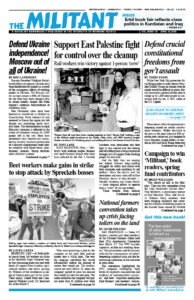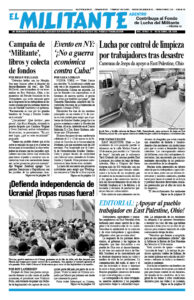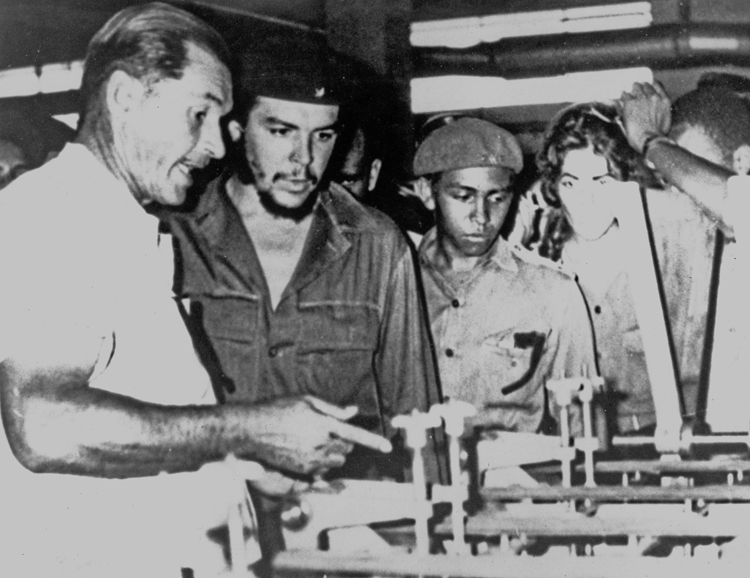HAVANA — Several industrial bakery workers from the U.S., members of the Bakery, Confectionery, Tobacco Workers and Grain Millers union, had the opportunity to exchange experiences with leaders of Cuba’s trade unions earlier this year.
We met with Jorge Luis Fajardo, general secretary of the National Union of Food and Fishing Industry Workers (SNTIAP), and Miguel Ángel Álvarez, from the international relations department of the Central Organization of Cuban Workers (CTC).
Our exchange centered on how production is organized in Cuba and how the working class here confronts the U.S. rulers’ bipartisan policy of punishing the Cuban people for making a socialist revolution on Washington’s doorstep. In return, we described what class-conscious workers in the U.S. are doing to build and strengthen our unions, and help workers understand why we need a political party of our own based on our fighting trade unions.
In Cuba, working people have been on the front lines, confronting the conditions caused by the over 60-year-long economic and political war waged against the Cuban people by Washington.
These conditions have been aggravated by the world capitalist crisis unfolding today. That includes the repercussions of Moscow’s invasion of Ukraine, which has drastically impacted the Cuban food industry’s ability to import grain essential for the production of flour.
Fajardo explained to us that four shiploads of grain a month are needed for a stable supply of bread, but only two a month arrive at best, and often just one. This results in widespread scarcity of bread products. Determined to ensure the population’s food needs, Cuba’s revolutionary government looks for ways to import grain from wherever they can, and food workers work hard to increase production.
The Cuban unionists were interested to hear about our work in the U.S. as members of the Socialist Workers Party as well as industrial workers. They were especially interested in the acts of solidarity extended to workers and farmers who are resisting the bosses’ efforts to shift the crisis of their for-profit system onto our backs by driving to lower our wages, extend the workday and speed up the production line, making working conditions more and more dangerous.
We explained how, as socialist workers, our aim is to transform the unions into fighting instruments as part of leading our class to take power out of the hands of the capitalist owners of industry.
Safety on the job is a constant struggle. Oil refinery workers fight to protect the safety of surrounding communities as well as themselves. Bakery workers say “no” to unsustainable long “suicide” shifts. Nurses have struck for lower patient-to-nurse ratios. Rail workers are fighting for shorter trains and larger crews. All are struggles to take greater control of our working conditions.
I told our fellow Cuban unionists how, after a co-worker of mine got his hand mangled in a machine that didn’t have protective guards, the union put safety signs on the machinery despite the bosses’ complaints. It was an important lesson for us in using the power of our union to limit the bosses’ efforts to force us into situations where injuries can happen. And things like this occur all the time as a result of the owners’ relentless push for profits.
I asked Fajardo how their union confronts unsafe working conditions like the incident I described on my job. He responded, “It never gets to that point.” In Cuba workers have control of safety conditions on the floor. If something is unsafe, they stop production and fix the problem. That’s an example of what we need to fight for.
In Cuba, workers are not sacrificed for the profits of a private owner. In 1959 working people made a revolution and took state power, taking the country’s industries and land out of the hands of U.S. imperialist owners and wealthy Cuban families. Farmers and workers here are committed to increasing production of food and other necessities, knowing — unlike in the capitalist U.S. — they are working for the people of Cuba.
Workers not only have control over job safety. Workers assemblies on the job periodically discuss plans for how to increase production not for profit, but in the interest of all Cubans.
We told our union hosts we would bring what we had learned in Cuba back to our co-workers and other working people and youth in the U.S., to explain concretely what a socialist revolution means — what can be done when our class holds state power.
This is what the U.S. capitalist rulers hate about the Cuban Revolution. They fear working people here will learn the truth about its example and begin to see workers and farmers can transform themselves and change the world.


